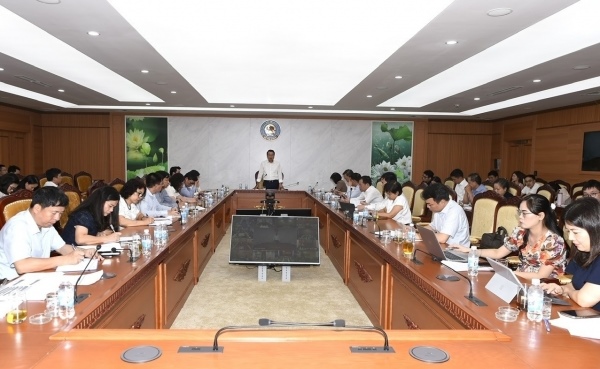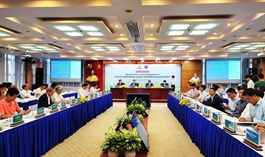Ministry of Finance partners with localities to address fiscal challenges
Ministry of Finance partners with localities to address fiscal challenges
The Ministry of Finance (MoF) is taking steps to assist localities in ensuring the smooth operation of the new financial and budgetary model under the two-tier local government structure at commune level.
On July 26, the MoF held an online conference with provincial and municipal authorities to provide guidance on financial and budgetary matters arising from the implementation of the two-tier administrative model at commune level. Deputy Minister of Finance Nguyen Duc Chi chaired the meeting.
During the session, representatives from various departments under the MoF listened to feedback from localities and addressed key issues regarding the new commune-level government model.
The main topics included state budget management at commune level, commune-level budget accounting, account setup and payment procedures through the State Treasury, and the reallocation of public assets.

The meeting on July 26, chaired by Deputy Minister of Finance Nguyen Duc Chi |
At the meeting, Nguyen Minh Tan, deputy director of State Budget Department, noted that since the newly merged communes officially began operating on July 1, many have encountered difficulties, relevant to non-standardised infrastructure, confusion within the new administrative apparatus, and delays in salary payments and operating expenses in certain areas.
Tan said that the MoFhas issued various guidance documents to ensure that state financial and budgetary operations remain uninterrupted during the restructuring process.
A key principle has been to maintain the revenue-sharing arrangements between provincial and commune budgets, ensuring continuity in both revenue sources and expenditure mechanisms post-merger.
“The new communes have been delegated full budgetary responsibilities and authority previously held by the merged entities. The prime minister's Decision No. 1390/QD-TTg, dated June 27, provides the legal foundation for uninterrupted budget planning and execution during the transition,” Tan added.
In his words, the MoF has provided detailed instructions for preparing the 2026 commune-level budget estimates in accordance with Circular No. 56/2025/TT-BTC, supporting the formulation of comprehensive and realistic three-year financial and budget plans for 2026–2028.
Circular No.56 guides the development of the 2026 state budget estimate and the three-year state budget-finance plan for 2026-2028.
In the area of treasury operations, Nguyen Manh Cuong, deputy general director of the State Treasury, reported that many commune-level budget estimation units have yet to open accounts at the State Treasury.
This issue stems from several causes, such as the absence of resolutions by local people's councils on revenue delegation and expenditure responsibilities; delays in appointing chief accountants and account holders; and a general lack of understanding of the procedures due to frequent personnel changes following the administrative reorganisation.
To address these issues, the State Treasury has requested that provincial people's committees direct local units to follow the MoF's guidelines. It also urged provincial departments of finance to provide guidance and clarify the number and scope of commune-level budget estimation units.
In cases where local people's councils and committees have yet to approve budget estimates, the departments of finance are expected to work with the State Treasury to provide interim budget allocations, particularly for salary payments and essential expenses, to ensure the continued functioning of local government operations.
Regarding the use of office buildings after the administrative mergers, a representative from the Public Asset Management Department noted that a relevant government decree issued on June 16 stipulates that for facilities that exceed space standards and norms, competent authorities must reallocate surplus space to other agencies or units that meet the criteria and have the need.
If no suitable recipient is available, the space should be retained and managed by the current or successor agencies to ensure efficient and economical use.
In his concluding remarks, Deputy Minister Chi directed all relevant departments within the MoF to compile local feedback and provide detailed, specific responses to support research and implementation at the local level.
Addressing concerns related to the appointment of chief accountants, Deputy Minister Chi assigned the Department of Accounting and Audit Management and Supervision to take the lead in reviewing the matter and negotiating solutions, with a report to be submitted to the ministry's leadership in the week coming for prompt resolution.
In response to local requests for training and capacity building, the deputy minister asserted the MoF's commitment to organising training sessions for financial personnel at all levels to meet the demands of the new period.
“The Ministry of Finance will stand alongside localities, ensuring that no financial, budgetary, accounting, or public asset management issues hinder the implementation of the two-tier local government model,” he stressed.
- 17:29 29/07/2025




























